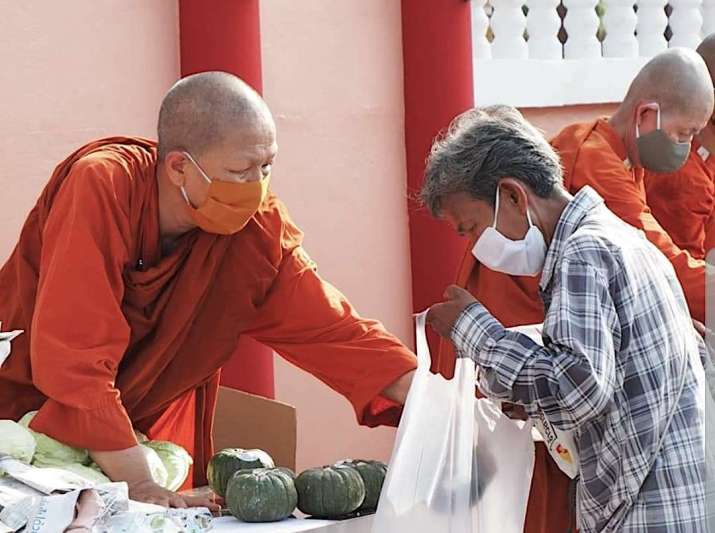
Venerable Dhammananda Bhikkhuni, born Chatsumarn Kabilsingh, is Thailand’s first fully ordained Theravada bhikkhuni. She received full monastic ordination as a bhikkhuni in Sri Lanka on 28 February 2003, and is now the abbess of Songdhammakalyani Monastery in Nakhon Pathom, near the Thai capital Bangkok. The temple was founded by her late mother, Voramai Kabilsingh, who was ordained in a Dharmaguptaka lineage* in Taiwan in 1971, becoming the first modern Thai bhikkhuni to do so and receiving the Chinese monastic name Ta Tao Fa Tzu
Dr. Chatsumarn Kabilsingh received an MA in religion from McMaster University in Canada, and a PhD in Buddhism from Magadh University in India. She taught for 27 years at Bangkok’s Thammasat University, in the Department of Philosophy and Religion. In lay life she was married, with three sons and six grandchildren.
In her academic life and since ordination, Ven. Dhammananda has been a prolific writer, authoring more than 100 books exploring the history of, and issues relating to, Thai Buddhism, including the place of women. As a layperson and as a monastic, she has worked tirelessly to re-establish the Theravada bhikkhuni lineage in Thailand so that women may become fully ordained monastics. This work has been controversial and has been met with resistance among some in Thailand’s religious institutions. At the same time, Ven. Dhammananda receives strong support from other Buddhist women and men in Asia and around the world.
Buddhistdoor Global: Ven. Dhammananda, I’d like to being by returning to the questions I asked the last time we spoke. First, your place, Songdhammakalyani Monastery, when was it founded?
Venerable Dhammananda Bhikkhuni: My mother, Voramai Kabilsingh, founded the temple in 1958.
BDG: How many nuns do you have in residence now?
VDB: right now, we have 12 fully ordained bhikkhunis here and three samaneris, all of whom are Thai.
BDG: Have you ordained any bhikkhunis from other countries?
VDB: I have given temporary ordination to more than 800 samaneris. Among them, one from Malaysia and several from the United States. This is a temporary ordination for nine days. We have fully ordained 11 bhikkhunis. But for full ordination we have to travel to either Sri Lanka or India.
BDG: So Theravada ordination is available in India?
VDB: Yes. This depends very much on the bhikkhus. If they have Theravada bhikkhus attending, a minimum of five, then the ordination is valid. Ven. Bhikkhu Bodhi was at one of our ordinations in Bodh Gaya.
BDG: You were ordained in Sri Lanka?
VDB: Yes. My full ordination was in 2003.
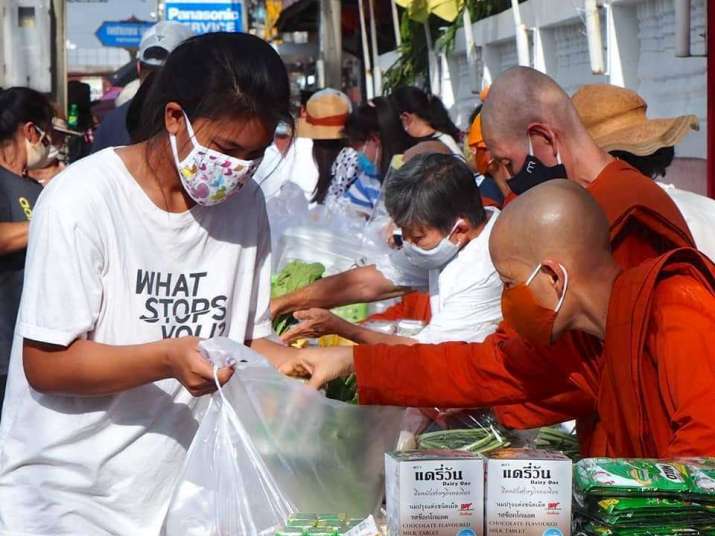
BDG: I remember you from the early 1990s, when I first visited Thailand and the International Network of Engaged Buddhists (INEB). You were still teaching at Thammasat University. When did you realize that you wished to be ordained?
VDB: It must have been in the air for a long time, you know, but not decided. In 2000, it became very clear that I wanted to take the monastic path. At the time I was very much involved in television; a very colorful life. You always get dressed up, you look nice, and I have to admit that I enjoyed that, looking nice. One da,y when I had put on my makeup, I looked at myself in the mirror and asked myself in English: “How long do I have to do this?” In Christian terms, this was clearly a call from God. Yes, it was very sudden and challenging to me. Yes, I had to make a decision. That must have been toward the end of 1999.
I went to Sri Lanka and I came back very quietly. When I went to be ordained, I was alone. My Sri Lankan host arranged everything for me. When I came back to Thailand, I was very quiet. But then I was invited to appear on television, on a military-owned channel. On the day that I was supposed to be interviewed, both programs were canceled at the last minute. The cancelation kind of blew up the issue. Why did the military block my interviews? That’s when the news of my ordination spread out to the public.
BDG: That that was your temporary ordination or your full ordination?
VDB: My novice ordination. Then I had to spend two years as a novice before I took full ordination.
BDG: I’d like to talk about what you’ve been doing during the pandemic. First of all, is everyone at your temple well?
VDB: Yes, we are keeping well.
BDG: Have there been many infections in the local community?
VDB: Actually, the first case in Thailand came from our province, Nakhon Pathom. The country went into lockdown on 25 March. The suffering of daily wage earners has been immense. We bhikkhunis felt it strongly as we first went on our morning alms round among the local people.
BDG: When did you start distributing food?
VDB: Very early on. We responded to the needs of the people very quickly. I felt that we had to do something. Actually, one of our volunteers began the work. The first time, we provided food for 40 people. We provided each family with five kilograms of rice, oil, chili paste, soap, shampoo, instant noodles, milk, drinks, fresh vegetables such as cabbage and pumpkin, and so on. A neighboring factory contributed eggs and bread. Later on, when the sangha joined in, we served 100 people, increasing to 150, then 200.
People lined up in front of our temple, right next to the highway—a long line. This was during April and May when it was very hot. But they stood in line. We marked the ground for social distancing. The participants respected personal health protection and maintained social distancing very well. Before they approached our tables, people had their temperatures taken and cleaned their hands with gel. We have been very cautious. In the field, we always wear masks and face shields as we provide food rations. We go out, under the wall outside the temple, setting up tables of offerings.
BDG: Wow! You know that this is not happening in the United States? No one is taking care like that!
VDB: It is truly from hearts to hearts. This is Buddhist practice. When people are experiencing so much pressure, this is an expression of compassion. We talk so much about metta and karuna, loving-kindness and compassion. But it is not inaction; when there is compassion, it has to overflow and you have to do something about it. You know that the feeling of having to do something is very strong.
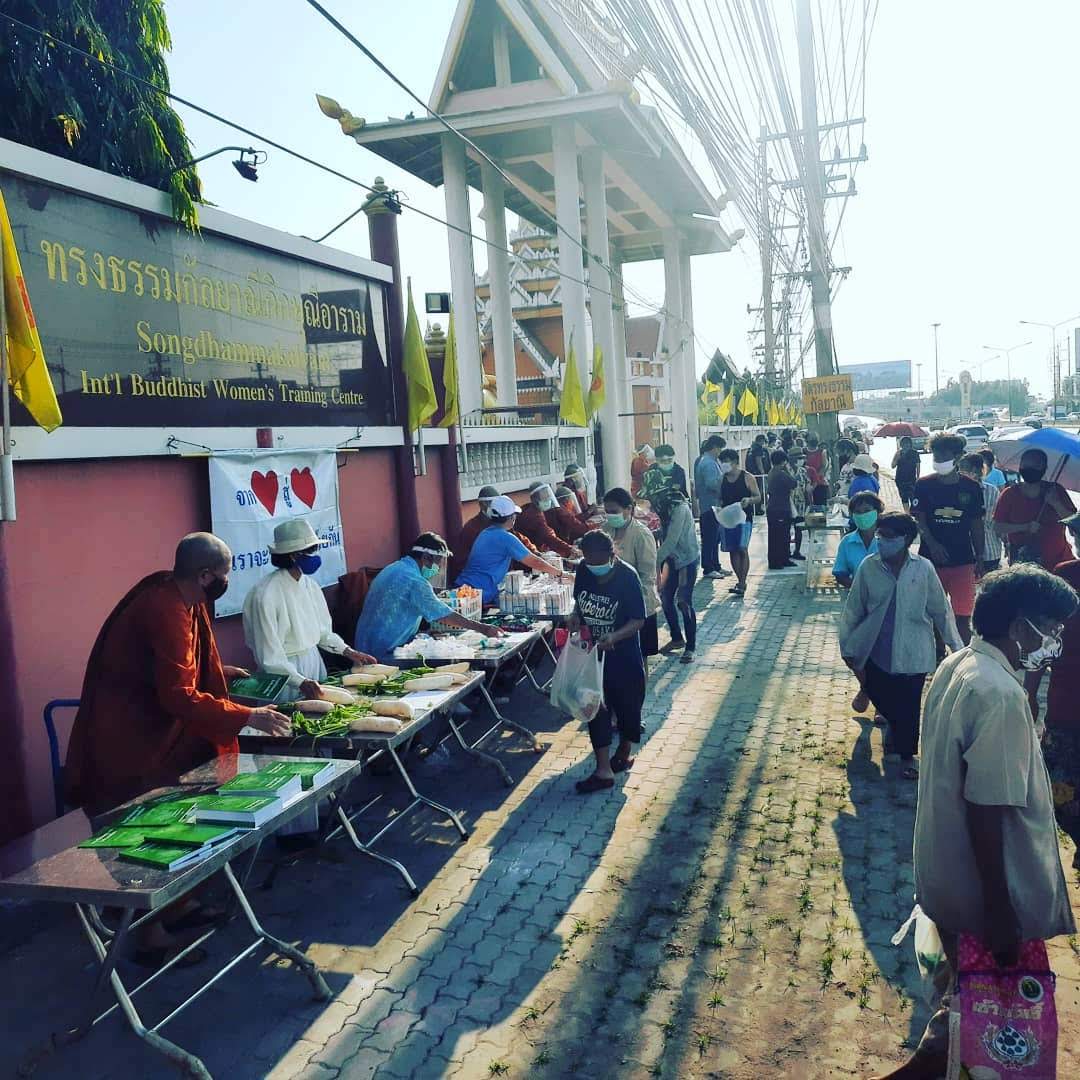
BDG: And are you still feeding people?
VDB: We did that for 10 weeks. And then the government said that they would provide 5,000 Thai baht (US$160) each month for the poor people, for those unable to help themselves. And I see there’s a gap in what the government is doing. They asked people to register online. You know, as soon as they said register online . . . I don’t even have a smartphone. How do you have online access when people don’t even have a smartphone? The very poor cannot access that. And then you have to provide a house number, but they don’t have homes; they live in shacks. The government will give out checks, or the money will be transferred to their bank accounts, but they don’t have bank accounts. I realized that there’s a big hole in how the government is providing funding. So we came up with the same funding: 5,000 Thai baht per family per month. And we have volunteers who look for people who don’t have access to government funds, screening the cases, and handing cash to each of them directly. We did that for three months, just completed. We have been able to help 55 families this way.
BDG: Where did your funding come from?
VDB: We were organizing the Asian Buddhist Conference in Nepal for this year, but now nobody can travel. So we borrowed 500,000 Thai baht (US$16,000) from those funds and transferred this amount to healing projects and relief. Well, people start coming in and we raised another 400,000 Thai baht (US$13,000).
BDG: Having completed these three months, what is your next plan?
VDB: I don’t think the economic situation will improve particularly until next year. We have to be realistic. Our temple itself has cut down on expenses. We cannot expect donations from people now. It’s really hard. On our side, we are lucky that we are in the safe zone and we have donors—from Switzerland, for example. We have been well cared for. But just today, we received an email from United States. Someone wanting to come and stay with us for retreat. But, it’s not possible. We are still very careful. Last week we learned that six Thai soldiers who went to the US for training returned with COVID-19. And last night we heard that Thai monks in Las Vegas died from COVID-19. So we are concerned about not opening a door to infection from the US. Now we are talking about providing them with meditation guidance via Zoom.
BDG: You know, last week my wife, Laurie, was on a conference call with INEB and she was really inspired by the relief work they’re doing. After the call, she told me, “Look at what they’re doing. What are we doing? What should we be doing here in Berkeley?” I think that’s a powerful message.
VDB: We are going to be doing more with our community because we’re okay, we’re stable, so we should be giving. If you can give, give, and if you need to receive, you should receive. Don’t be afraid if you don’t have anything. We started giving people two kilos of rice. I was on the back of a pickup truck and putting rice into small bags. That picture went on Facebook, and a man came up to me and he said, “I have to do something about it.” Compassion arises within you, you know, and you need to do something. We didn’t have much and then this man came with 600 kilos of rice in his pickup, the best kind of Jasmine rice from Yasothon Province, 500 kilometers to the northeast
This man alone brought 3,000 kilos of rice. Every week he would come with rice. Then, when people saw this on Facebook, I didn’t even have to say anything. So I don’t think you have to do much. Simply help, and help will come.
BDG: Are other temples and monasteries in Thailand doing this kind of work?
VDB: We have about 26,000 temples in Thailand, but from the media we only hear about a few. Some big temples provide pre-cooked breakfasts, lunches, and suppers, but they simply called restaurants and they would bring ready-made boxes of food. In a very few temples do we see monks coming out to serve. But in our case, they saw that we were doing it ourselves. We were dragging sacks of rice, pushing rice on carts, you know, putting food on tables so that people could pick it up.
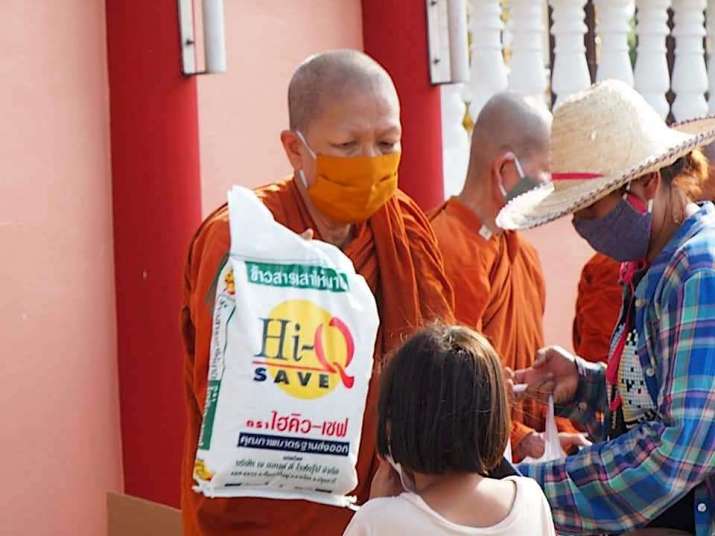
BDG: Are there other temples in Thailand for female monastics?
VDB: Oh yes, since my ordination we now have 285 bhikkhunis in 40 provinces.
BDG: It’s amazing that the women’s order has grown in this way, that there are so many bhikkhunis. What do you see as your work in the next period, until the pandemic lifts?
VDB: Right now, we are in Vassa (rains retreat). During the rains, we study the Vinaya. Each day we have class, and we send out videos from the classes to bhikkhuni aramas in other provinces.
BDG: That’s good. It’s something all of us have struggled with. And we’ve had to struggle to put our entire program of practice on a digital platform. We’re learning things about this every day.
Ven. Dhammananda, I’m so happy to be in touch with you and to be able to have had this conversation. You know, the meeting last week really warmed my heart. The people who were at the meeting are some of my closest friends. And now, we’re trying to get together every two weeks instead of every two years.
If you wish to support the work of Ven. Dhammananda Bhikkhuni and Songdhammakalyani Monastery, please visit the donation page on the Thai Bhikkhunis website.
* One of the 18 or 20 early Buddhist schools. See more.
See more


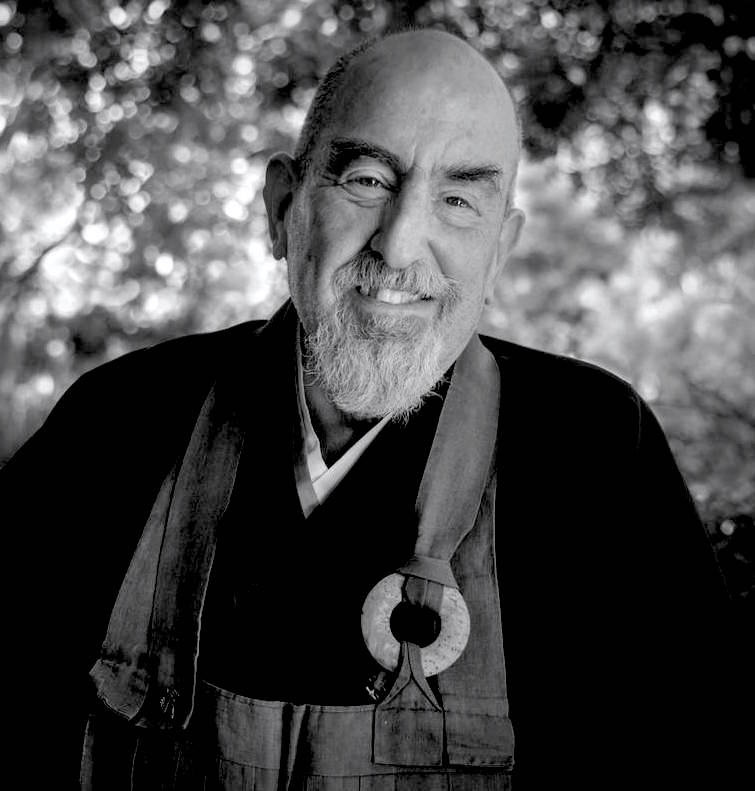










Greetings to all…this very important news service has been super helpful and insightful..I have gotten a great deal of encouragement, relief and peaceful acceptance of things as they are, and am incredibly respectful and humbled by the continuous daily efforts of dedicated Buddhists around the world, especially those whose lives are at risk! Thank you so very much for this wonderful, timely and compassion driven news service. Barb Woods at Sapphire Forest Studio in the Sierras